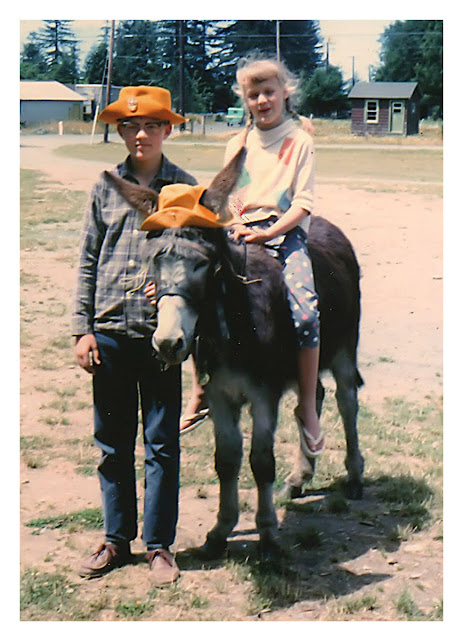
Ozark Grace
For me, life is fairly simple: love God, love your neighbor, do your art. As a Christian, my first priority is loving God, and I believe a part of loving Him is being grateful for what He's given us. Here in the Ozarks, we have much to appreciate and enjoy. And so this blog attempts to do a little of this: appreciate God's wonders, and share them with you, my neighbors.
Saturday, February 7, 2026
Expectations

Wednesday, December 24, 2025
Thursday, June 26, 2025
At the Top of the Pillar
At the top of our front porch pillar is a colorful nest where five baby phoebes peer down silently as I pass. They stack together like spices in a pantry, and with their insatiable appetites, both parents work in tandem to provide a steady stream of food.
Early in the morning, I hear the male phoebe's song from across the yard. Perched on a bare yucca stem, he scans the ground for a fat bug to feed his nestlings. He swoops down, flying low like a crop duster, and pivots to catch his plump prey. After admiring his kill for a moment, he flies up to deliver a meal to the hungry chicks. Following him, the female wrestles with a butterfly to provide dinner for the voracious nestlings. Not all of their prey submit willingly.
Wednesday, June 11, 2025
Dad and the Acacia Tree
Where I grew up in rural Northern California, the four seasons were not sharply defined like they are here in the Ozarks. Most of the trees were evergreens, predominately redwoods, which didn't have noticeable seasonal changes; our seasons were defined more subtly. Summer was squealing with shock as we dipped into the frigid Smith River, and riding Larry Johnson's donkey, Joe. In the evenings, after dinner, we'd play softball with friends from the neighborhood, disbanding reluctantly at dusk when we could scarcely see home plate.
Fall would begin with a familiar knot in my stomach at the loss of freedom. Then, I'd settle into the routine of math competitions, science projects, and history class with the handsome Mr. Vernon.
But there was always something magical about spring. Spring was riding my bike to the beach down Moorehead Road, past the fields of cows and the handmade sign, For Sale - Red Wriggler Fish worms. Spring was the hum of bees, the fragrance of wildflowers on the wind, and the feeling that things were all right with the world.
In my world, spring was also defined by the acacia tree. My family lived in the parsonage behind the town's only church. In the front yard of the church was a vast acacia tree. It was a perfect tree for climbing, its massive limbs reaching so low that all but the very youngest of us could manage to scramble up and perch there after church. The limbs were covered with tiny holes, which, at the time, I thought were characteristic of acacia trees. I have since realized they were the work of woodpeckers and may have indicated something about the health of the tree. Whatever its condition, it always managed to put on a grand display in the spring when its tiny blossoms, like miniature yellow tennis balls, covered the tree, garnering the attention of everyone in town.
My father, besides being the pastor, also acted as a groundskeeper. When he determined the tree was no longer safe, he cut it down without any notice, an act that managed to anger a significant part of the congregation and much of the community. But Dad was never too concerned about public opinion. He may have seemed impulsive at times, but he had probably been thinking about that tree for a long time. Dad didn't want to get into an extensive discussion about it or have a committee formed to study the implications of such an action. And he certainly didn't want to see any children get hurt.
One way or another, people managed to get over the loss, and nobody could stay mad at Dad for long. He was just too fun to be around. His laughter would fill a room like the aroma of mom's Sunday pot roast.
After all these years, I've decided that, besides keeping the church kids safe, my father did us all a favor by cutting down that old acacia tree. He reminded us that nothing here on earth, not even things of exquisite beauty, are permanent. Centuries ago, the prophet Isaiah said it best:
"The grass withers and the flowers fall,
because the breath of the Lord blows on them.
Surely the people are grass.
The grass withers and the flowers fall,
but the word of our God endures forever."
Isaiah 40:7, 8
In a world of falling blossoms, it's good to know that the God whose word endures is the One who loves us deeply, who sent His only Son so we can live.
And this is the testimony:
God has given us eternal life,
and this life is in His Son.
1 John 5:11
First published on March 20, 2011
Wednesday, May 21, 2025
Thunder
Back in the bedroom, I sat on the floor near the sliding glass doors, my neck craned, and watched in wonder as lightning split the sky, and the heavens roared. It was spectacular, everything I had hoped for.
I will never cease to marvel at thunder and lightning or the reminder that the One who made the storm is the One who loves us more than we can comprehend.
Who can understand how He spreads out the clouds,
how He thunders from His pavilion?
Job 36:19
For God so loved the world that He gave His only begotten son...
Check out more sky images at the Skywatch site!
First published on June 7, 2014,











